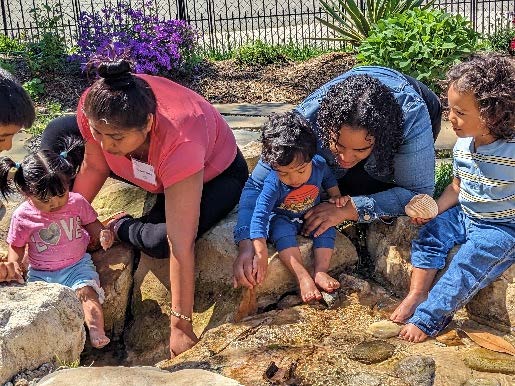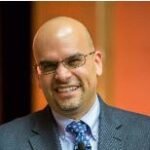 El Futuro Continues to Expand Care Approaches to Improve Access to Care for All
El Futuro Continues to Expand Care Approaches to Improve Access to Care for All
El Futuro is thrilled to add peer support services to our existing array of care. For many, taking the step to receive mental health support can be scary, foreign, or stigmatized by the community. Peer support services are a proven method for building solidarity, understanding that we are not alone in the challenges we face, and gaining hope that healing and recovery are possible.
El Futuro’s new Peer Support team will have lived experience with mental health challenges, offering services that help our clients with depression and anxiety gain hope for recovery, resilience, and the ability to achieve their dreams for the future. Our program will address the critical need to expand the workforce of bilingual, culturally responsive mental health providers. What’s more, El Futuro is already being looked to by the State of NC to advise on the development of a Spanish-langauge certification program for Latino Peer Support Specialists. (Currently, the only Certification program, which improves compensation and the ability to bill for services is in English only.) This is one of the many ways our team continues to innovate to ensure improved access to and engagement with care for all individuals in our community.
What is Peer Support?
Peer support involves individuals with lived experience of mental health challenges offering support to others facing similar issues. This approach is recovery-oriented, person-centered, and trauma-informed, emphasizing mutual respect and shared experiences.
We started this program with a Landscape Analysis, here are some findings
Our landscape analysis revealed significant gaps in peer support services for the Latino community in North Carolina:
- Limited Bilingual Specialists: Out of 5,274 peer support specialists in the state, only 92 are identified as Latino, Hispanic, or bilingual.
- Training Gaps: Existing training programs are only available in English and lack cultural relevance for the Latino community.
- Certification Barriers: The certification process and materials are not available in Spanish, creating obstacles for bilingual individuals seeking certification.
What is coming for the program
Year 1 (2024):
- Develop organizational readiness with technical assistance from the National Council.
- Conduct staff interviews and surveys to gather feedback.
- Hire a project manager and provide staff training.
Year 2 (2025):
- Recruit, hire, and onboard two peer support specialists.
- Begin offering peer support services in the second quarter.
Year 3 (2026):
- Aim to serve 112 participants.
- Focus on making the program financially sustainable and improving service delivery.
The Peer Support Specialists will be based at our Durham clinic, providing essential support to individuals with anxiety and depression. By integrating peer support into our services, we hope to reduce stigma, enhance recovery, and build a stronger, more supportive community. Stay tuned for updates as we roll this service out beginning in January 2025.

 Alvely Alcántara, LCSW
Alvely Alcántara, LCSW Rossy C. Garcia, MEd
Rossy C. Garcia, MEd  Katy Sims, MD
Katy Sims, MD  Everardo Aviles, LCSW, LCAS (Eve)
Everardo Aviles, LCSW, LCAS (Eve) As a medical anthropologist and social work researcher, Dr. Gulbas’ research embodies interdisciplinarity through the integration of applied theories of health and human development with qualitative and ethnographic methodologies. Her work seeks to understand how people—children, families, and providers—navigate complex sociocultural landscapes in the pursuit of mental health. Most of her work, to date, focuses attention on developing more robust interpretations of suicide risk. With funding from the National Institutes of Mental Health, this body of research has contributed to advancements in theoretical and empirical knowledge of the broader contexts within which youth suicide risk is situated.
As a medical anthropologist and social work researcher, Dr. Gulbas’ research embodies interdisciplinarity through the integration of applied theories of health and human development with qualitative and ethnographic methodologies. Her work seeks to understand how people—children, families, and providers—navigate complex sociocultural landscapes in the pursuit of mental health. Most of her work, to date, focuses attention on developing more robust interpretations of suicide risk. With funding from the National Institutes of Mental Health, this body of research has contributed to advancements in theoretical and empirical knowledge of the broader contexts within which youth suicide risk is situated.  R. Gabriela Barajas-Gonzalez is a developmental psychologist and an assistant professor of Population Health at NYU Grossman School of Medicine. Dr. Barajas-Gonzalez is the principal investigator of a study that examines the impact of immigration-related threat and stress on school communities. She earned a PhD in developmental psychology from Columbia University and hold a BA in human biology from Stanford University. Dr. Barajas-Gonzalez is the daughter of Mexican immigrants and a first gen college student.
R. Gabriela Barajas-Gonzalez is a developmental psychologist and an assistant professor of Population Health at NYU Grossman School of Medicine. Dr. Barajas-Gonzalez is the principal investigator of a study that examines the impact of immigration-related threat and stress on school communities. She earned a PhD in developmental psychology from Columbia University and hold a BA in human biology from Stanford University. Dr. Barajas-Gonzalez is the daughter of Mexican immigrants and a first gen college student. Dr. Parra-Cardona is an Associate Professor in the Steve Hicks School of Social Work (SHSSW) at the University of Texas at Austin. At the SHSSW, he serves as Coordinator for Mexico and Latin American initiatives. He also serves as Area Director for Research at the UT Austin Latino Research Institute. Dr. Parra-Cardona’s program of research is focused on the cultural adaptation of evidence-based parenting interventions for low-income Latinx populations in the US and Latin America.
Dr. Parra-Cardona is an Associate Professor in the Steve Hicks School of Social Work (SHSSW) at the University of Texas at Austin. At the SHSSW, he serves as Coordinator for Mexico and Latin American initiatives. He also serves as Area Director for Research at the UT Austin Latino Research Institute. Dr. Parra-Cardona’s program of research is focused on the cultural adaptation of evidence-based parenting interventions for low-income Latinx populations in the US and Latin America. Bianka Reese, PhD, MSPH is a research scientist and program evaluator specializing in adolescent and young adult sexual and reproductive health. Her previous research in the experiences of Latinx LGBTQ+ youth stems from her work as the Research and Evaluation Manager at SHIFT NC (Sexual Initiatives For Teens), where she led largescale evaluations of multilevel, community-based sexual health promotion initiatives and research projects aimed at elevating the voices of diverse youth in North Carolina. Dr. Reese is currently the Senior Research Strategist at Creative Research Solutions, LLC, an award-winning national evaluation, research, and assessment firm.
Bianka Reese, PhD, MSPH is a research scientist and program evaluator specializing in adolescent and young adult sexual and reproductive health. Her previous research in the experiences of Latinx LGBTQ+ youth stems from her work as the Research and Evaluation Manager at SHIFT NC (Sexual Initiatives For Teens), where she led largescale evaluations of multilevel, community-based sexual health promotion initiatives and research projects aimed at elevating the voices of diverse youth in North Carolina. Dr. Reese is currently the Senior Research Strategist at Creative Research Solutions, LLC, an award-winning national evaluation, research, and assessment firm. Tania Connaughton-Espino, MPH is an independent researcher focused on adolescent and young adult sexual and reproductive health. Her interest in the experiences of Latinx LGBTQ+ youth stems from her previous work with SHIFT NC (Sexual Initiatives For Teens), where she led the training and evaluation department, conducted capacity-building workshops for youth serving professionals including on the topic of how to be more affirming of LGBTQ youth, and from her extensive experience working with the Latinx population in NC.
Tania Connaughton-Espino, MPH is an independent researcher focused on adolescent and young adult sexual and reproductive health. Her interest in the experiences of Latinx LGBTQ+ youth stems from her previous work with SHIFT NC (Sexual Initiatives For Teens), where she led the training and evaluation department, conducted capacity-building workshops for youth serving professionals including on the topic of how to be more affirming of LGBTQ youth, and from her extensive experience working with the Latinx population in NC. Maru Gonzalez, EdD is an Assistant Professor and Youth Development Specialist in the Department of Agricultural and Human Sciences at North Carolina State University. Her areas of inquiry include youth development with a focus on activism, social justice, and the experiences of LGBTQ+ young people across familial, school, and community contexts.
Maru Gonzalez, EdD is an Assistant Professor and Youth Development Specialist in the Department of Agricultural and Human Sciences at North Carolina State University. Her areas of inquiry include youth development with a focus on activism, social justice, and the experiences of LGBTQ+ young people across familial, school, and community contexts.  Nayeli Y. Chavez-Dueñas, PhD
Nayeli Y. Chavez-Dueñas, PhD Hector Y. Adames, PsyD
Hector Y. Adames, PsyD